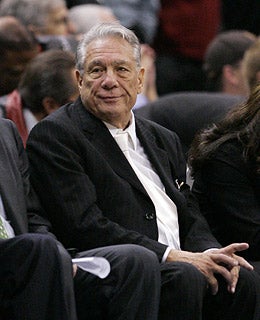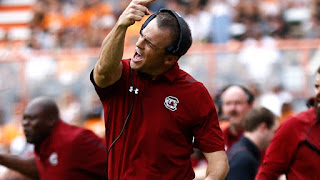Freedom of Expression and Religion is Dead in America! Or is it?
Over the past few months the sports world has again crossed paths with the political world, involving religion and race (and I say this begrudgingly because I hate it when sports and politics intermingle).
First, religion.
On April 10, the Freedom From Religion Foundation issued a complaint to the Clemson University football program, and its head coach Dabo Swinney, on the grounds that, "Christian worship seems interwoven into (it's) football program," said FFRF attorney Patrick Elliott.
You can read the full press release from FFRF here.
In a nutshell, they cite Clemson chaplain James Trapp as pushing a Christian ideology, say the team pushes Bible studies, has "Church Days," and holds baptisms through the team.
Swinney then offered a response in a prepared statement 13 days later, which you can read here.
There is no point in debating the merits of these charges, since in Swinney's response he essientially admits that his program and school does what they are cited with doing.
The issue for me comes from talking heads and the public, and the contingent that cries the freedom of religion is dead in this country.
The first argument we hear in favor of Clemson is that there is no such thing as seperation of church and state in the U.S. Constitution. Those people would be right.
Here is the first amendment in its entirety, according to the national archives.
Congress shall make no law respecting an establishment of religion, or prohibiting the free exercise thereof; or abridging the freedom of speech, or of the press; or the right of the people peaceably to assemble, and to petition the Government for a redress of grievances.
The first amendment clearly states that it prohibits the government from pushing one religion and/or denying the rights of another to its citizens.
But there are multiple Supreme Court cases that do establish the inferred right of seperation of church and state, which you can read through here. (I'd focus on McCollum v Board of Education Dist. 72, Engel v Vitale and Allegany County v ACLU if you are short on time)
To me, all those cases simply mean if you are going to have one religion, you have to have representation of the other, or none at all.
On another ground, Clemson University is a publicly funded institution, that also has federal dollars in it, which you can read here. With that being the case, Clemson University, and all its associations, fall under federal guidelines, just as any government entity would.
This doesn't mean Swinney and his staff can't be Christian. They have a right individually to be who they are. This all simply means that in the public eye, they have to be neutral on the matter. No more team "Church Day" trips, unless they also go to mosques, synagogues and other places of worship, no more team chaplain, simply label him a non-denominational life coach, and no more baptisms at practice, which you can read about here.
This doesn't mean an individual's religious freedom is being destroyed, it simply means that Clemson, a federally funded institution, and its employees are following federal law. What the coaches do in their private lives is THEIR BUSINESS. What they do in public and at work, well I'm a believer in their rights end where others noses begin.
And since we are talking about employees, employers and private lives, it gives us a nice segueway into the Donald Sterling incident.
Sterling, the principle owner of the National Basketball Associations' Los Angles Clippers organization, was caught being recorded by his then-girlfriend saying he doesn't want to see black people attending his games. Listen to the full recordings here.
Sterling was recently hit with a lifetime ban from the NBA by commissioner Adam Silver , which you can read here. He was also fined $2.5 million.
What this means for the Clippers is unknown at the time, but I'm betting they have new ownership next season.
But again, the fringe media and blogosphere has gone nuts saying free speech is dead. I promise this rebuttle will be much shorter.
Is it fishy his girlfriend recorded this conversation? I'd say so, but that is a tangent to move the debate, and I won't let that happen.
Sterling's right to say what he wants has not been infringed on. He could clearly, and still can say, whatever he wants about whoever he wants whenever he wants. But people also have the right to say something back, and the NBA did that.
Remember the NBA is a multi-billion dollar business, and it is, at its heart, and employer. At any company, if there is an employee that is a black mark, no pun intended, or a PR nightmare, the company has a right to remove that employee on grounds they are a detriment to that companies image, and profitability.
If a cashier, or a manager at a store said they didn't want to serve a person of color, or a different religious background, that employee would be fired, because lost customers are lost revenue.
If the NBA kept Sterling as owner of the Clippers, there is a good chance civil rights groups would've protested the league, and hurt profits.
The NBA, and commissioner Silver, had every right to ban Sterling.
This is yet another case where you can say what you want in this country, all speech is protected, even hate speech. But that doesn't mean there aren't consequences for what you say.
First, religion.
On April 10, the Freedom From Religion Foundation issued a complaint to the Clemson University football program, and its head coach Dabo Swinney, on the grounds that, "Christian worship seems interwoven into (it's) football program," said FFRF attorney Patrick Elliott.
You can read the full press release from FFRF here.
In a nutshell, they cite Clemson chaplain James Trapp as pushing a Christian ideology, say the team pushes Bible studies, has "Church Days," and holds baptisms through the team.
Swinney then offered a response in a prepared statement 13 days later, which you can read here.
There is no point in debating the merits of these charges, since in Swinney's response he essientially admits that his program and school does what they are cited with doing.
The issue for me comes from talking heads and the public, and the contingent that cries the freedom of religion is dead in this country.
The first argument we hear in favor of Clemson is that there is no such thing as seperation of church and state in the U.S. Constitution. Those people would be right.
Here is the first amendment in its entirety, according to the national archives.
Congress shall make no law respecting an establishment of religion, or prohibiting the free exercise thereof; or abridging the freedom of speech, or of the press; or the right of the people peaceably to assemble, and to petition the Government for a redress of grievances.
The first amendment clearly states that it prohibits the government from pushing one religion and/or denying the rights of another to its citizens.
But there are multiple Supreme Court cases that do establish the inferred right of seperation of church and state, which you can read through here. (I'd focus on McCollum v Board of Education Dist. 72, Engel v Vitale and Allegany County v ACLU if you are short on time)
To me, all those cases simply mean if you are going to have one religion, you have to have representation of the other, or none at all.
On another ground, Clemson University is a publicly funded institution, that also has federal dollars in it, which you can read here. With that being the case, Clemson University, and all its associations, fall under federal guidelines, just as any government entity would.
This doesn't mean Swinney and his staff can't be Christian. They have a right individually to be who they are. This all simply means that in the public eye, they have to be neutral on the matter. No more team "Church Day" trips, unless they also go to mosques, synagogues and other places of worship, no more team chaplain, simply label him a non-denominational life coach, and no more baptisms at practice, which you can read about here.
This doesn't mean an individual's religious freedom is being destroyed, it simply means that Clemson, a federally funded institution, and its employees are following federal law. What the coaches do in their private lives is THEIR BUSINESS. What they do in public and at work, well I'm a believer in their rights end where others noses begin.
And since we are talking about employees, employers and private lives, it gives us a nice segueway into the Donald Sterling incident.
Sterling, the principle owner of the National Basketball Associations' Los Angles Clippers organization, was caught being recorded by his then-girlfriend saying he doesn't want to see black people attending his games. Listen to the full recordings here.
Sterling was recently hit with a lifetime ban from the NBA by commissioner Adam Silver , which you can read here. He was also fined $2.5 million.
What this means for the Clippers is unknown at the time, but I'm betting they have new ownership next season.
But again, the fringe media and blogosphere has gone nuts saying free speech is dead. I promise this rebuttle will be much shorter.
Is it fishy his girlfriend recorded this conversation? I'd say so, but that is a tangent to move the debate, and I won't let that happen.
Sterling's right to say what he wants has not been infringed on. He could clearly, and still can say, whatever he wants about whoever he wants whenever he wants. But people also have the right to say something back, and the NBA did that.
Remember the NBA is a multi-billion dollar business, and it is, at its heart, and employer. At any company, if there is an employee that is a black mark, no pun intended, or a PR nightmare, the company has a right to remove that employee on grounds they are a detriment to that companies image, and profitability.
If a cashier, or a manager at a store said they didn't want to serve a person of color, or a different religious background, that employee would be fired, because lost customers are lost revenue.
If the NBA kept Sterling as owner of the Clippers, there is a good chance civil rights groups would've protested the league, and hurt profits.
The NBA, and commissioner Silver, had every right to ban Sterling.
This is yet another case where you can say what you want in this country, all speech is protected, even hate speech. But that doesn't mean there aren't consequences for what you say.





Comments
Post a Comment